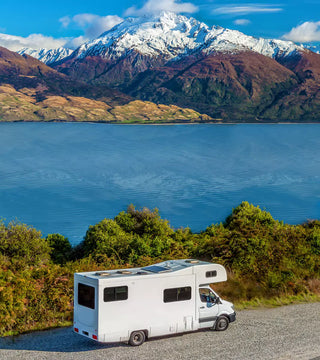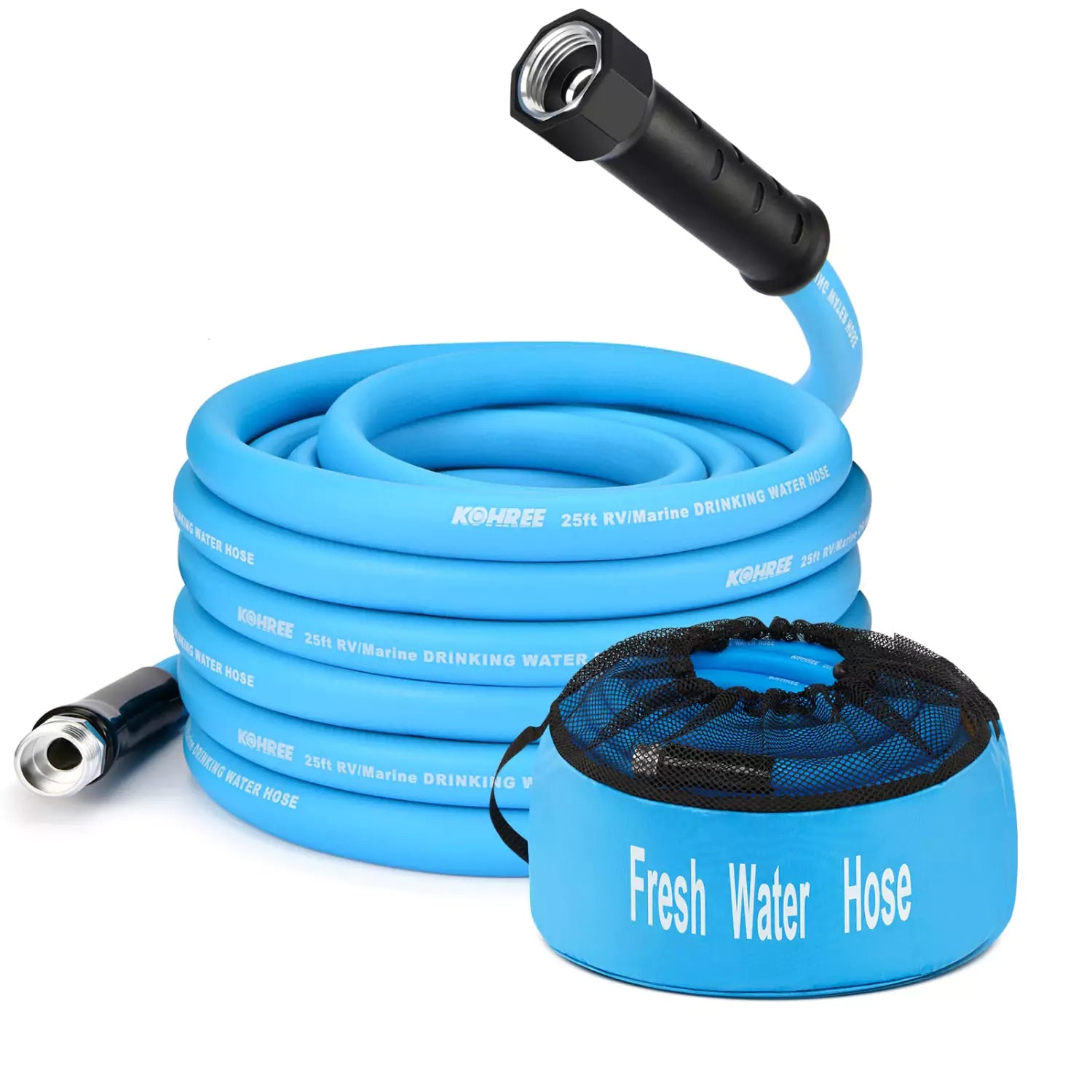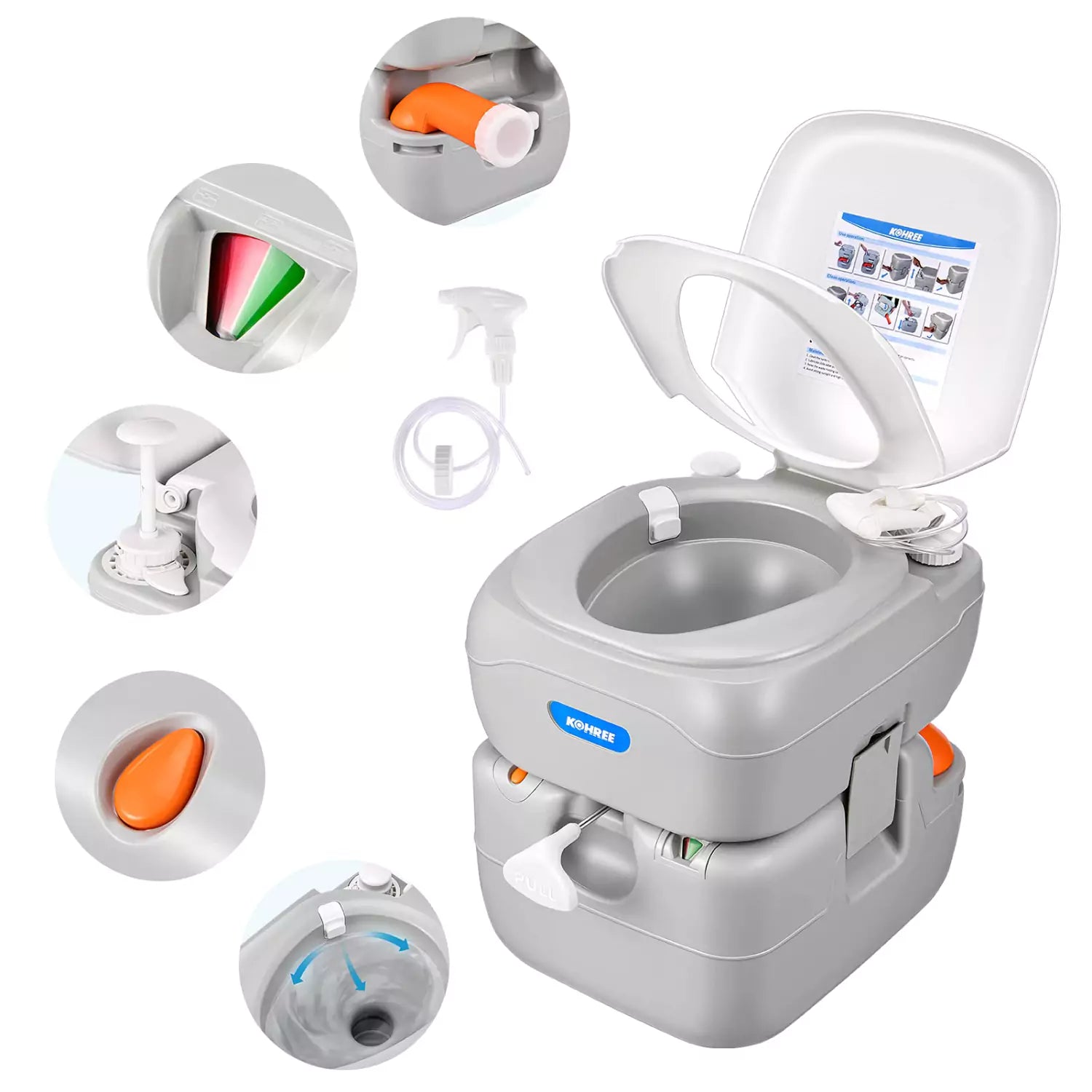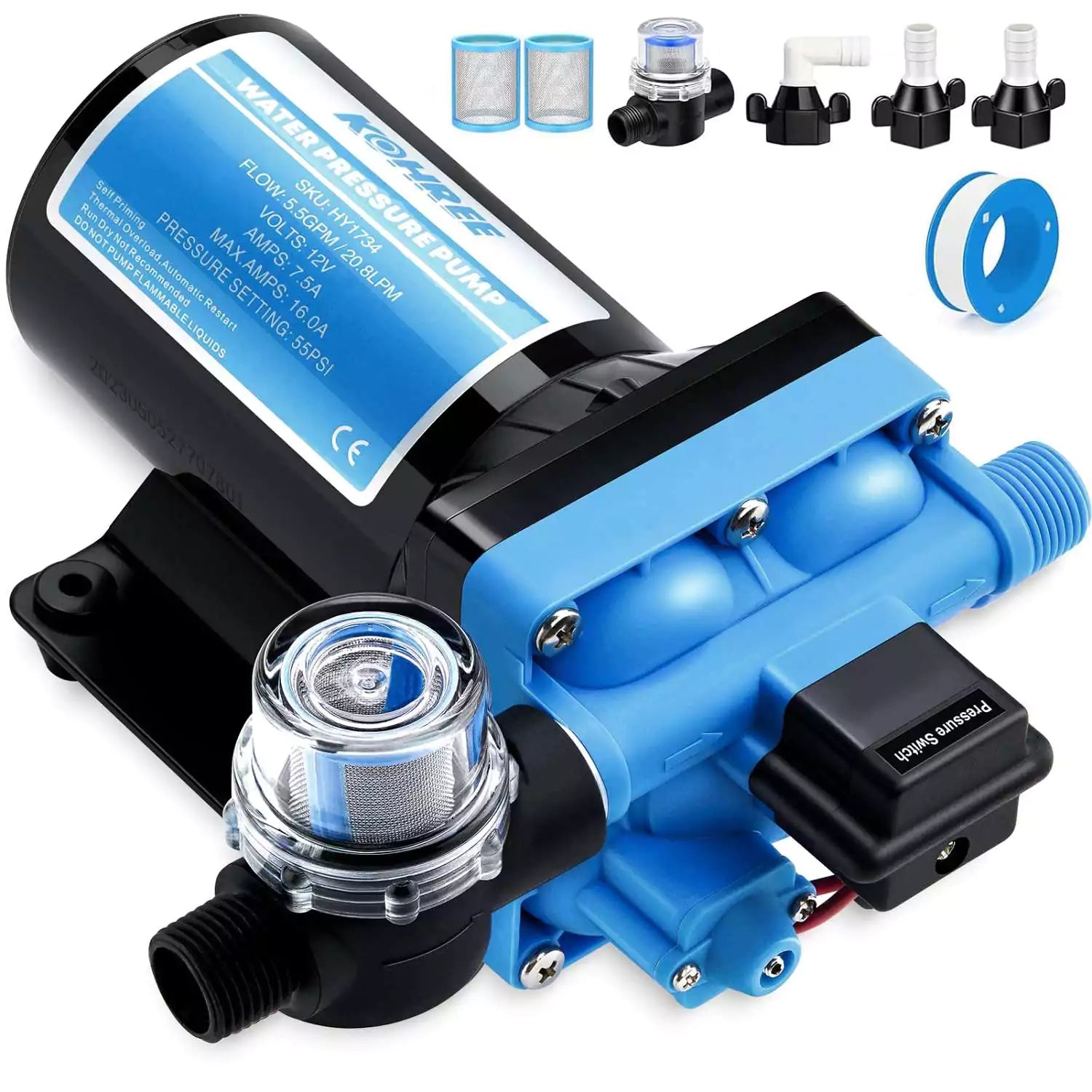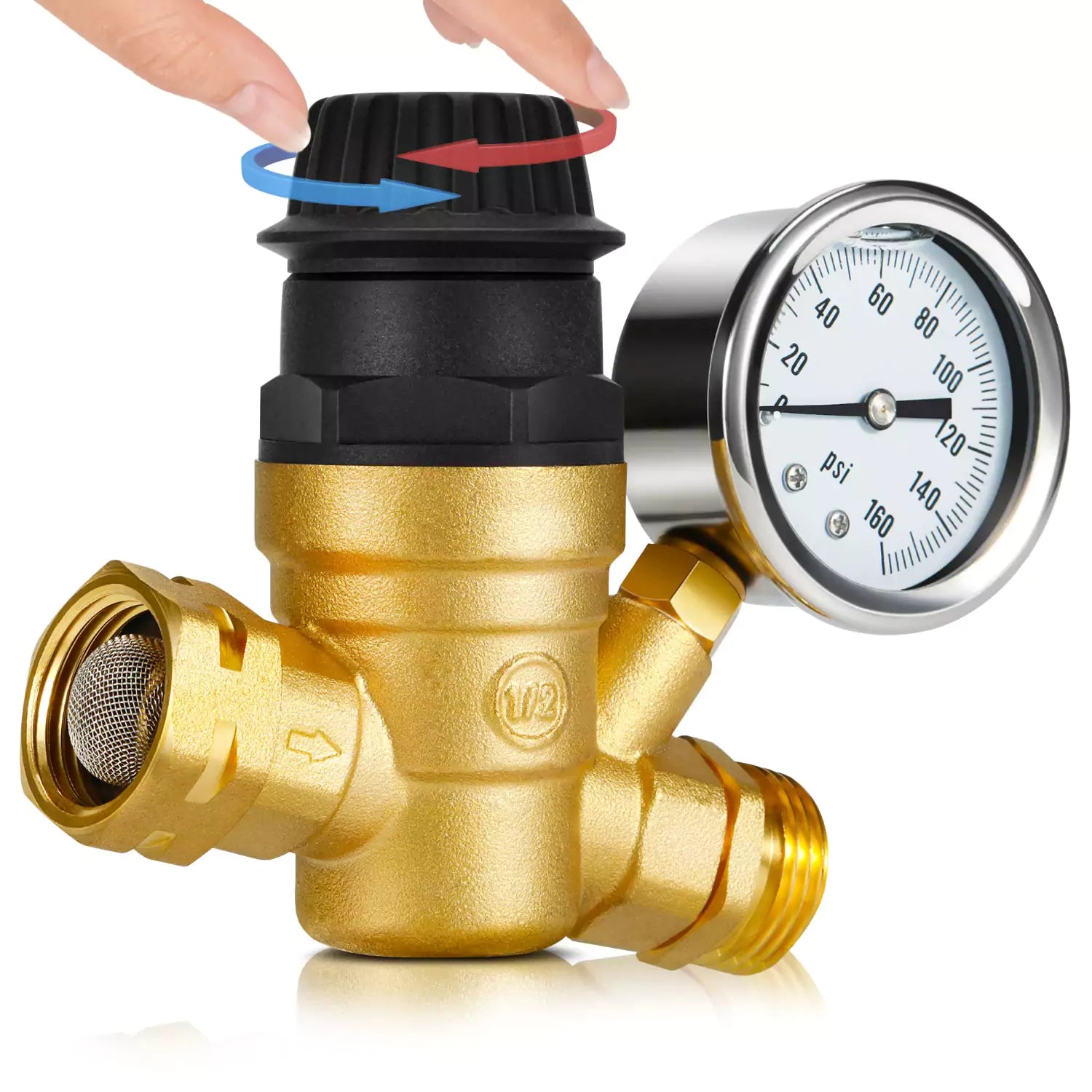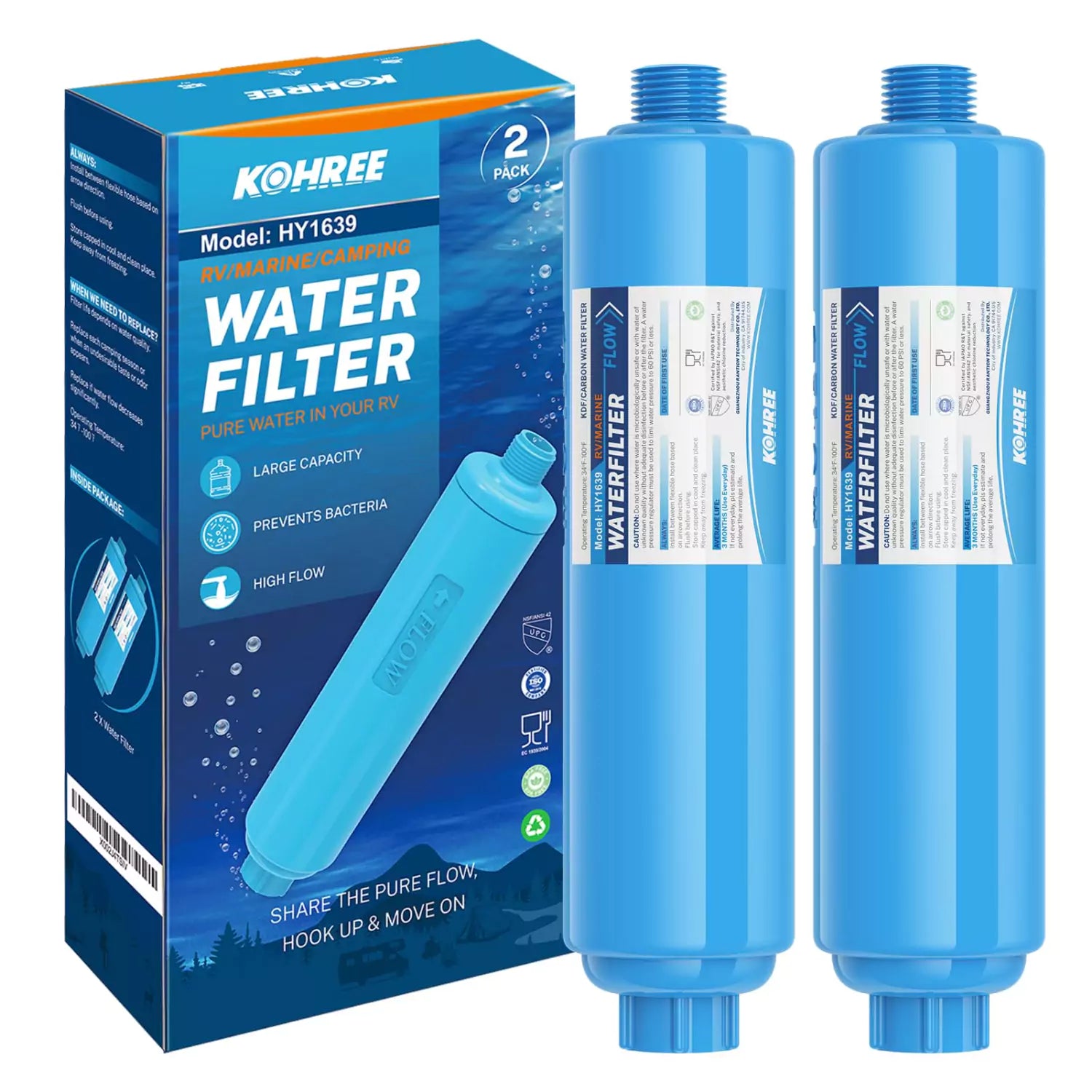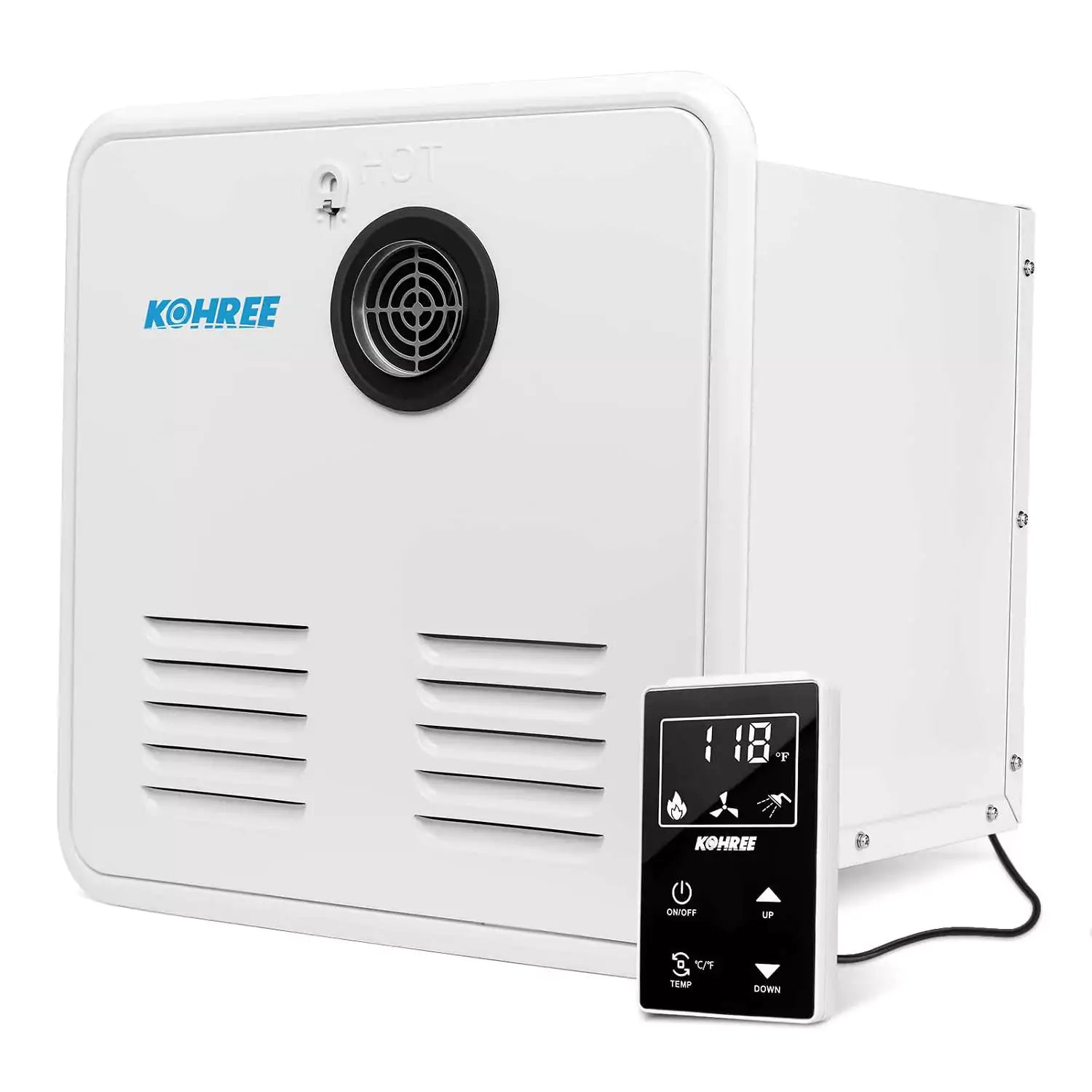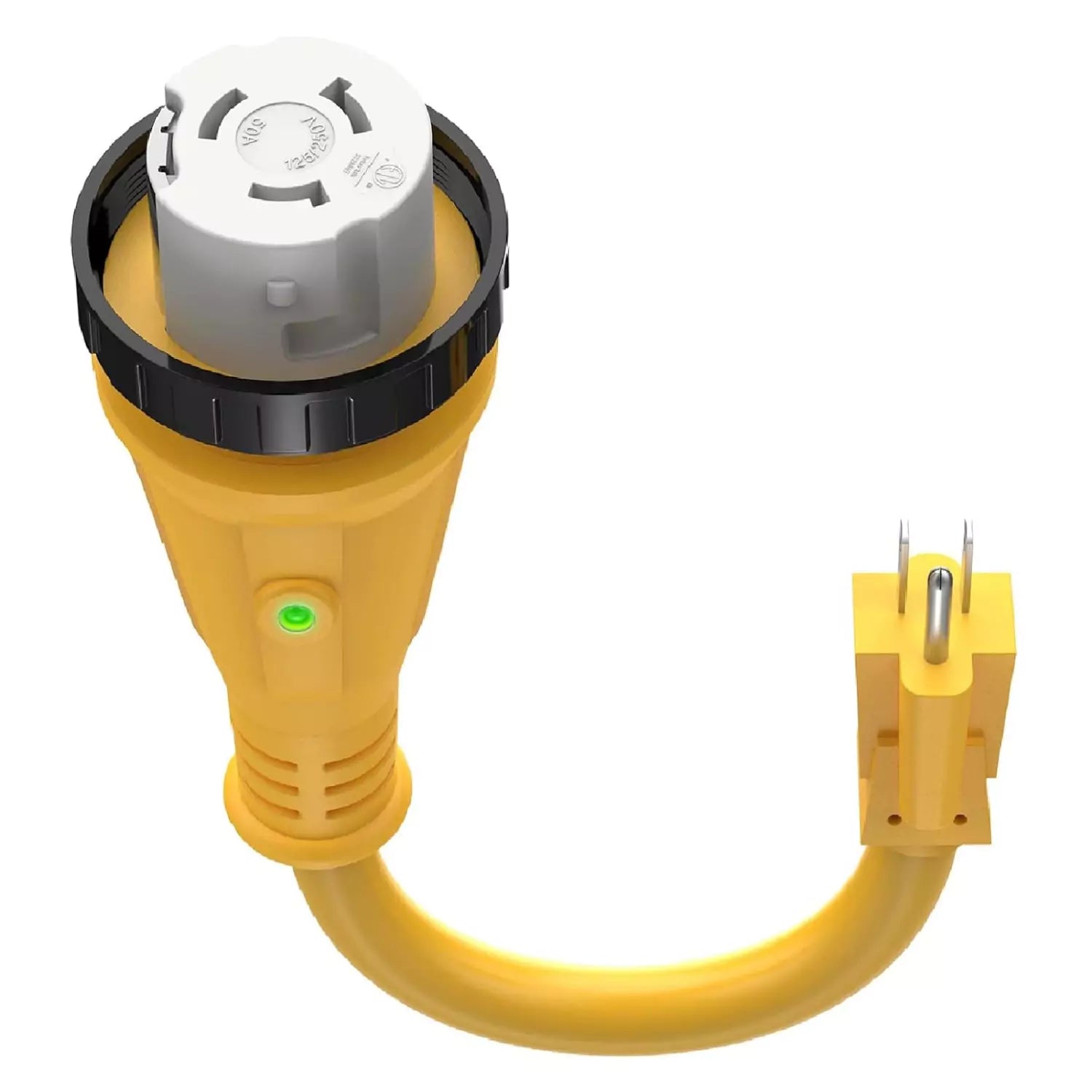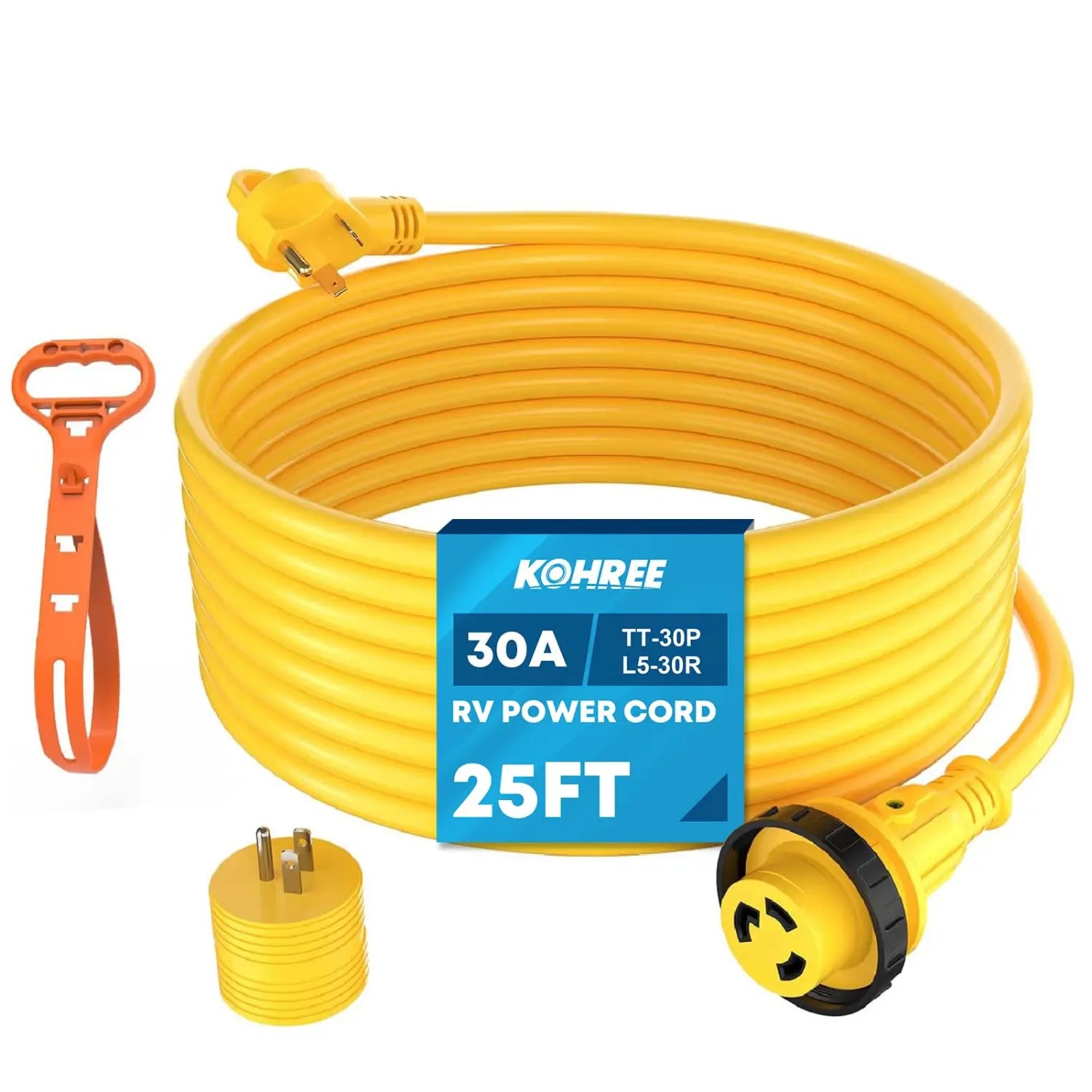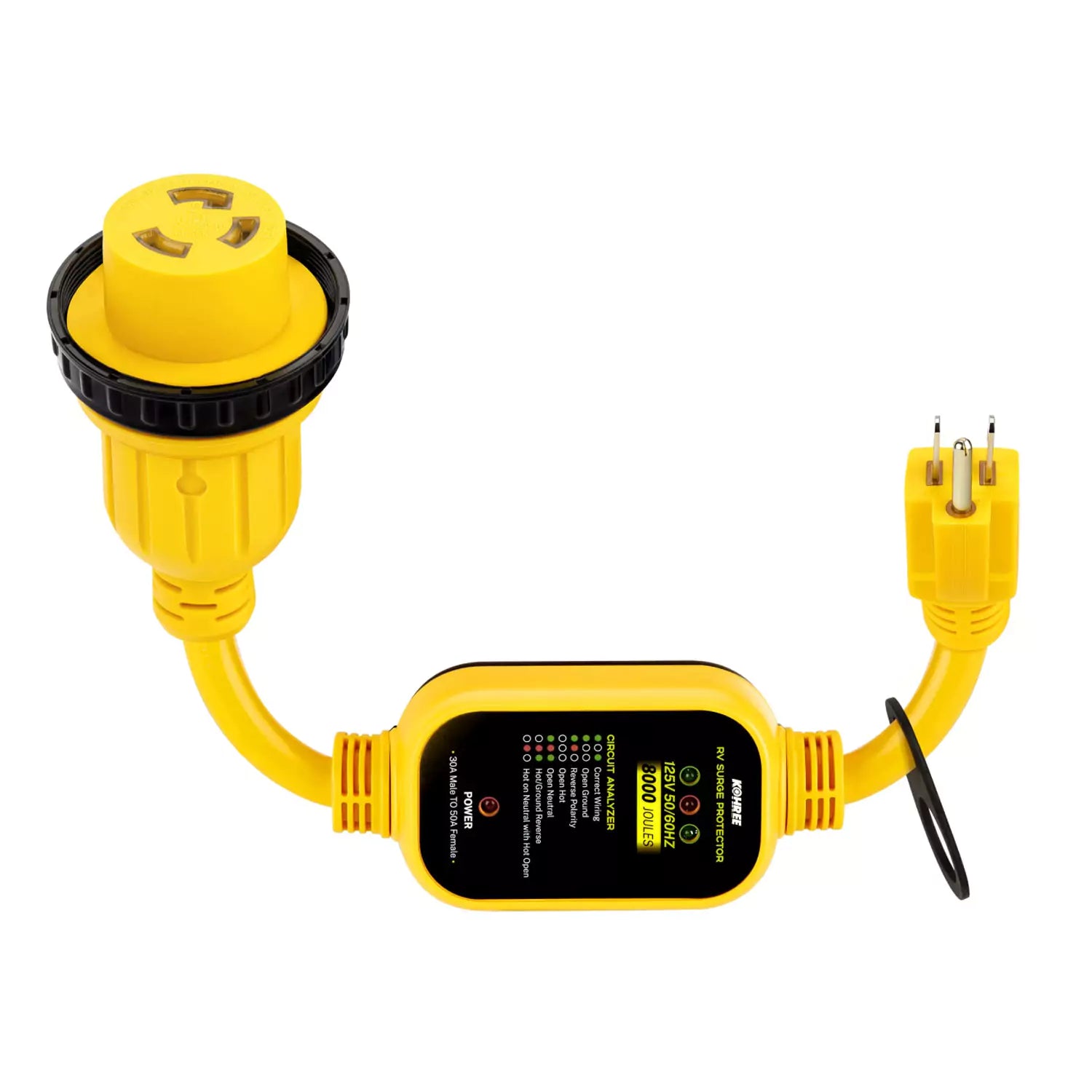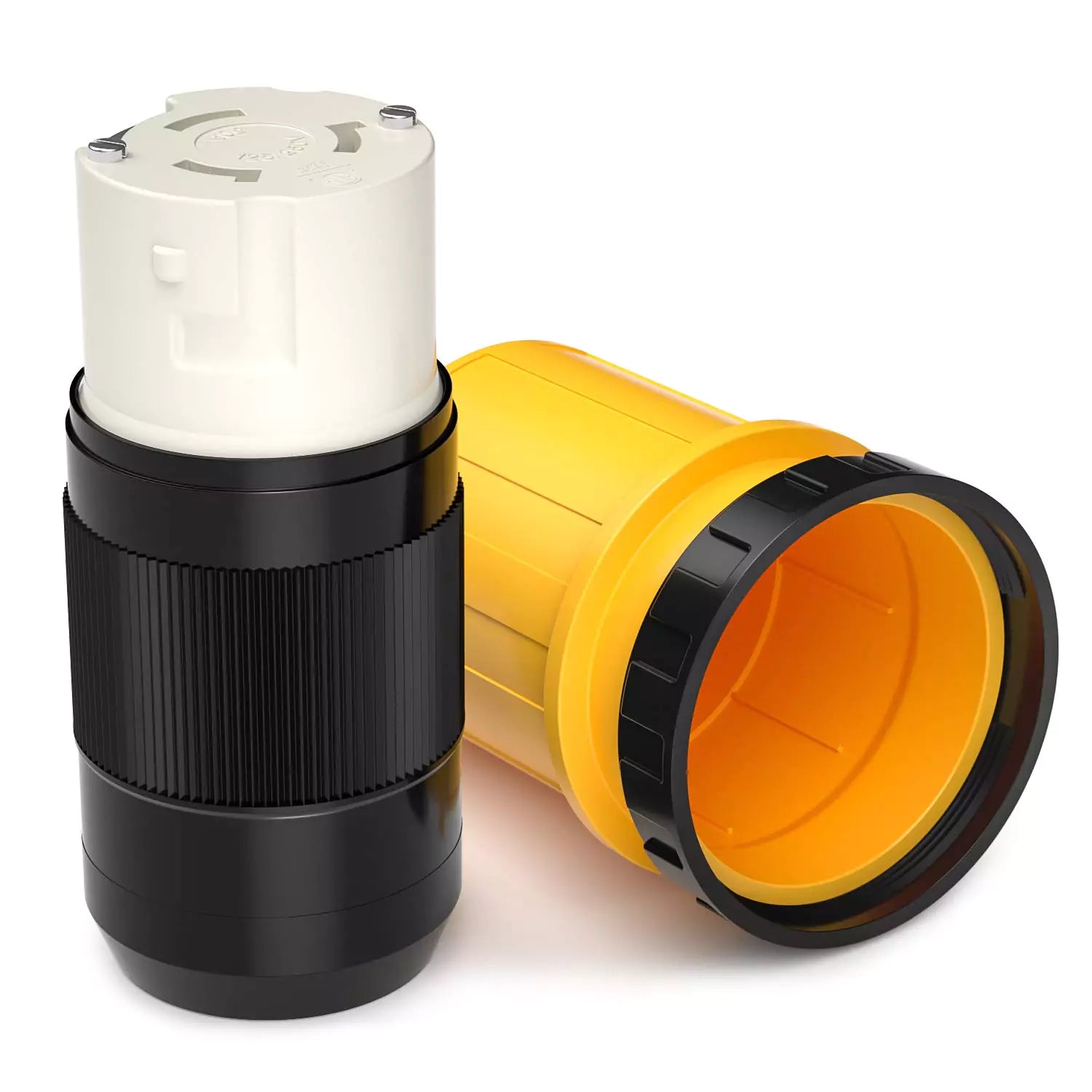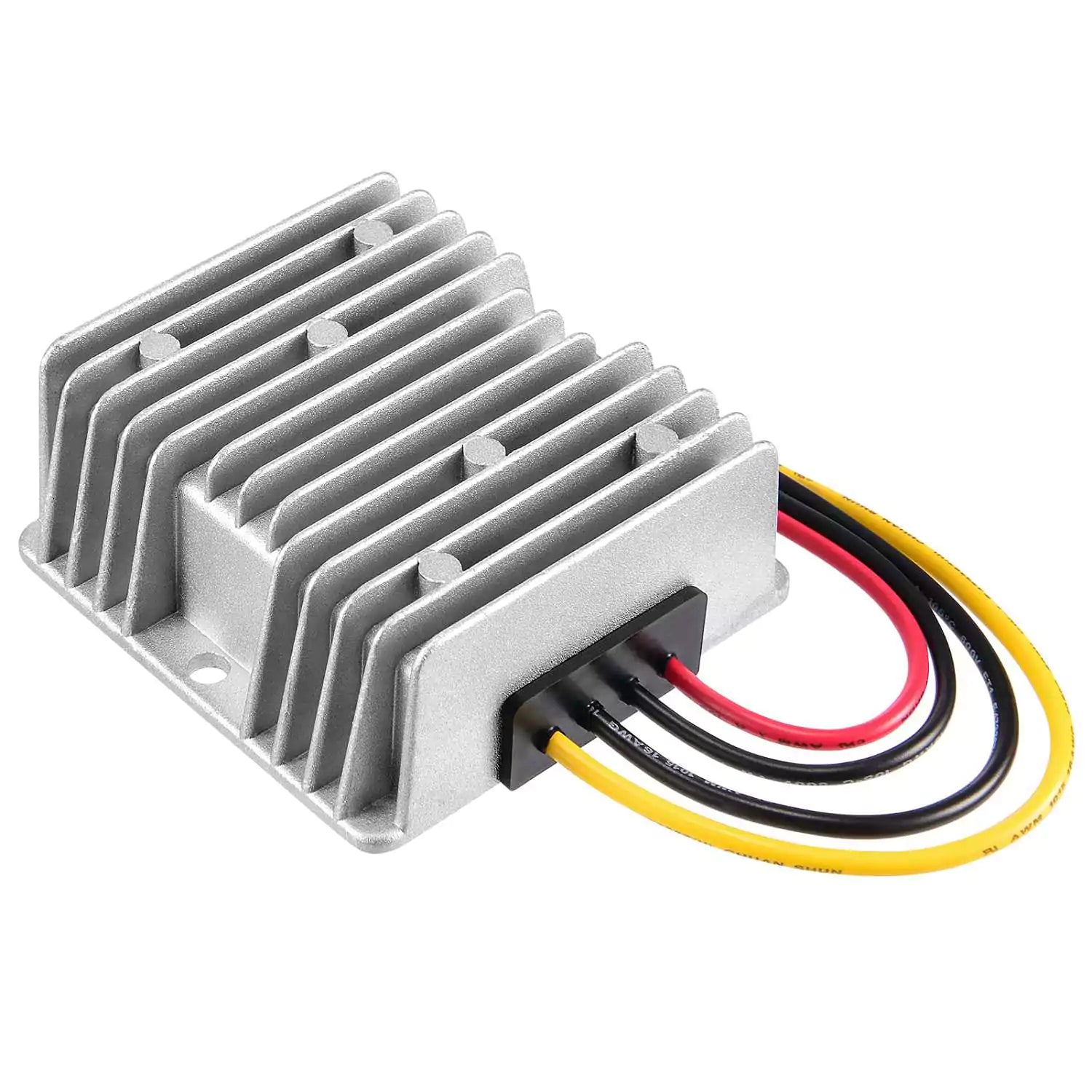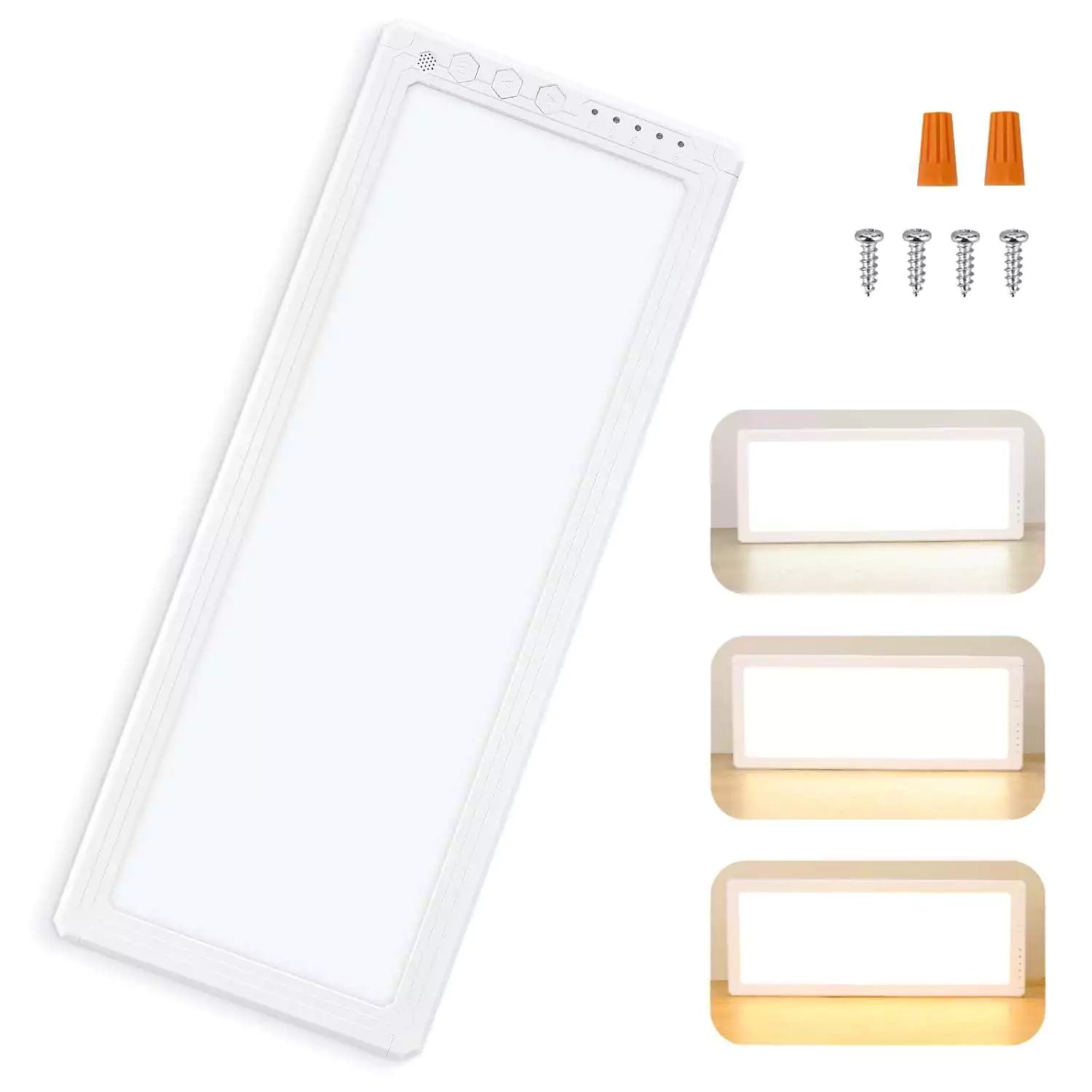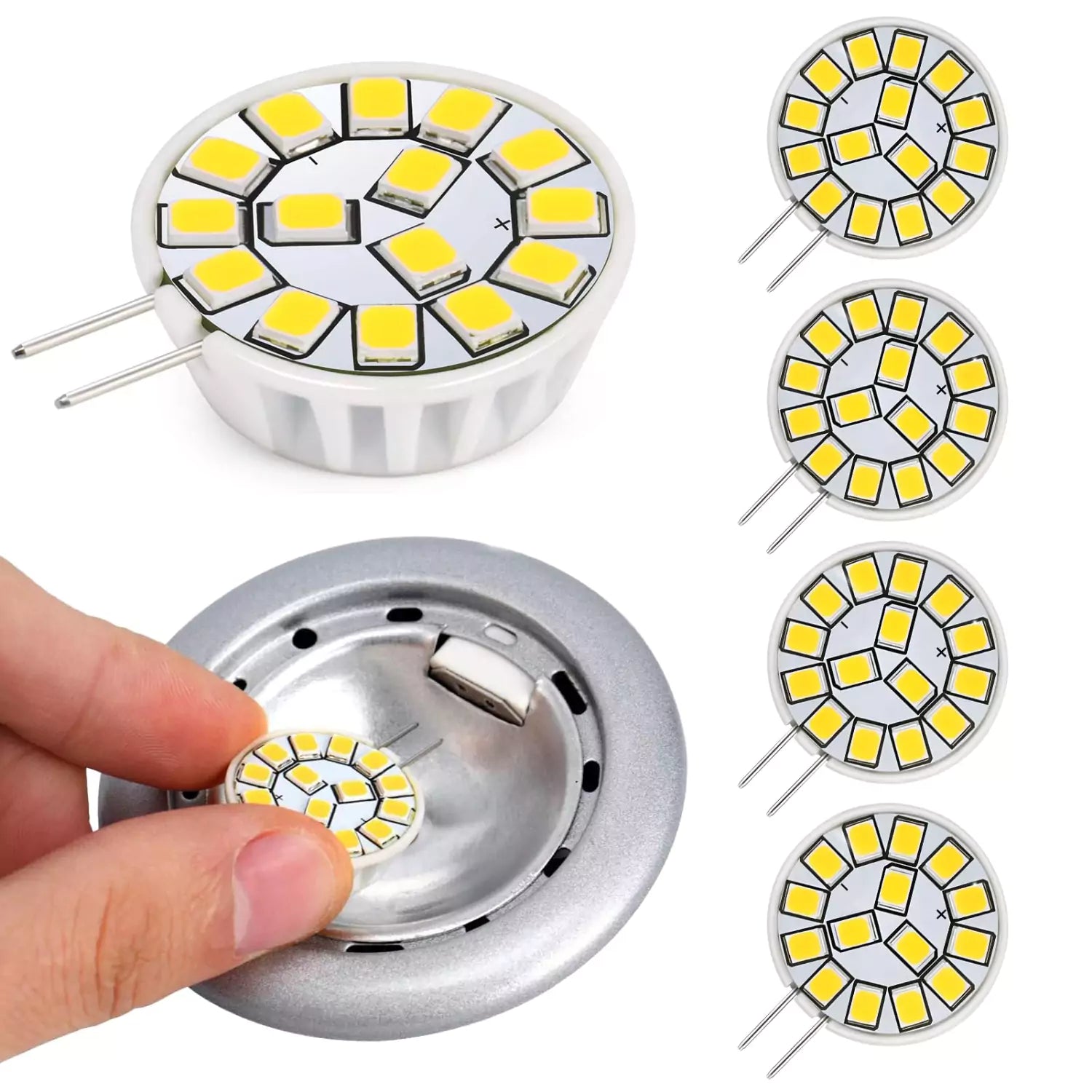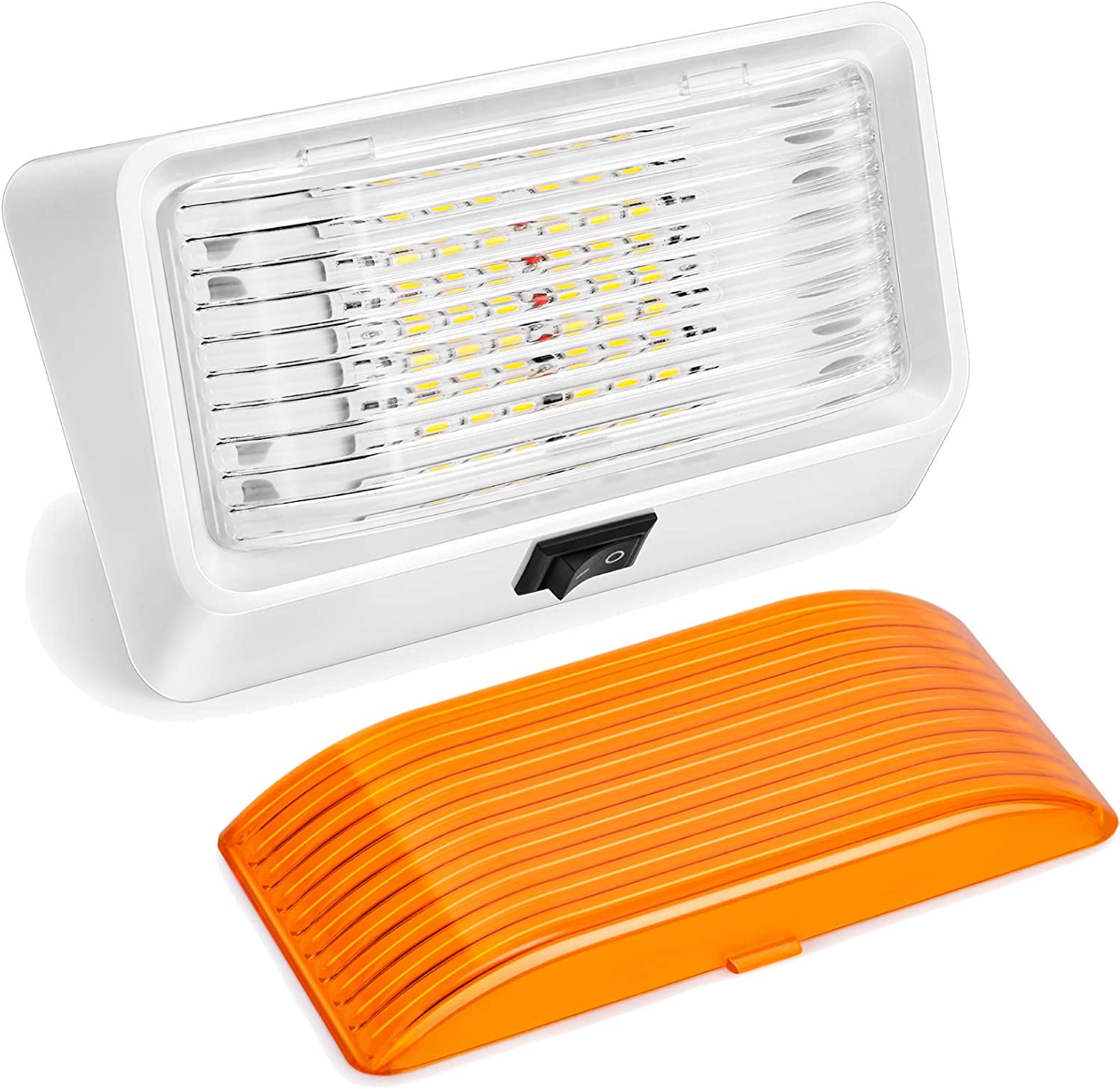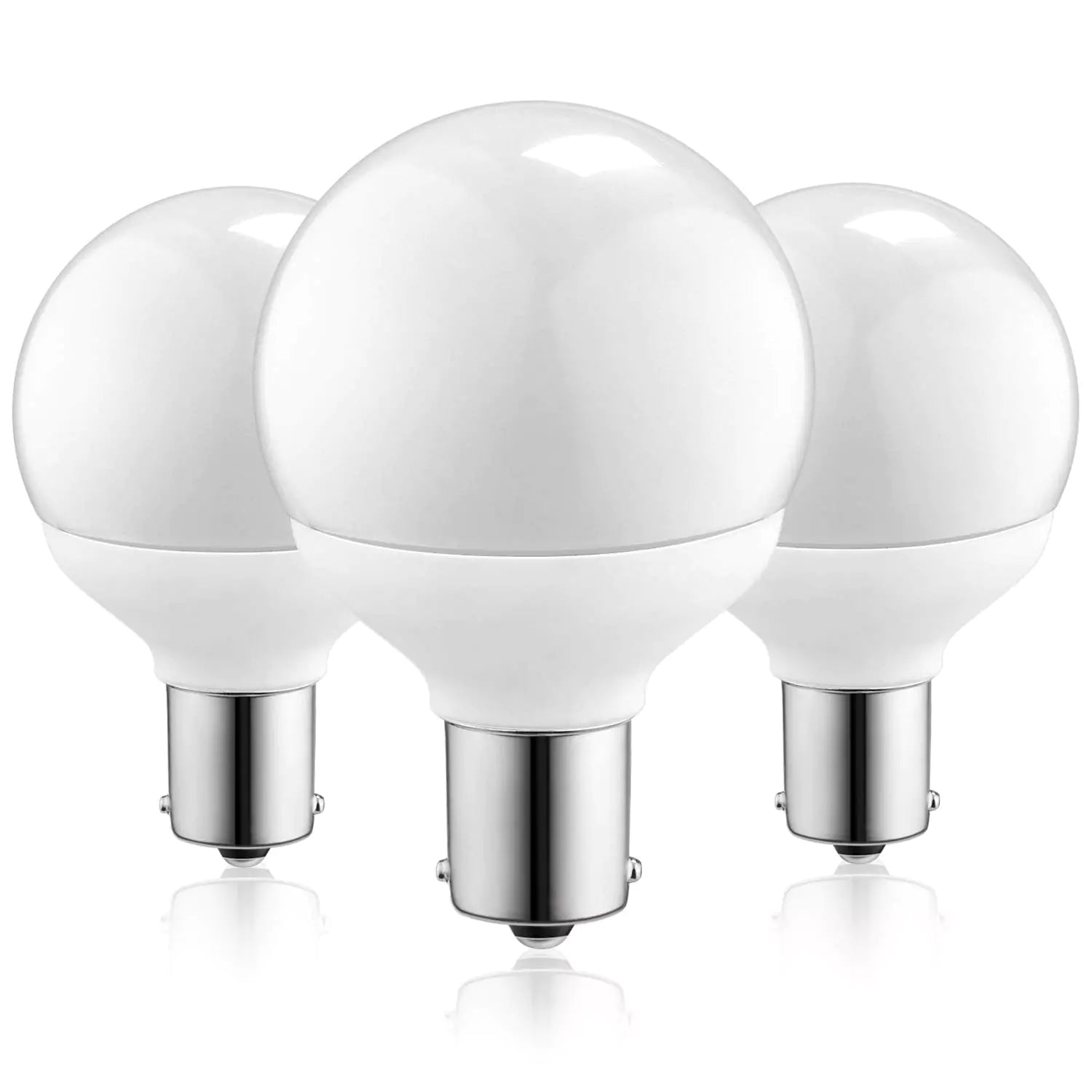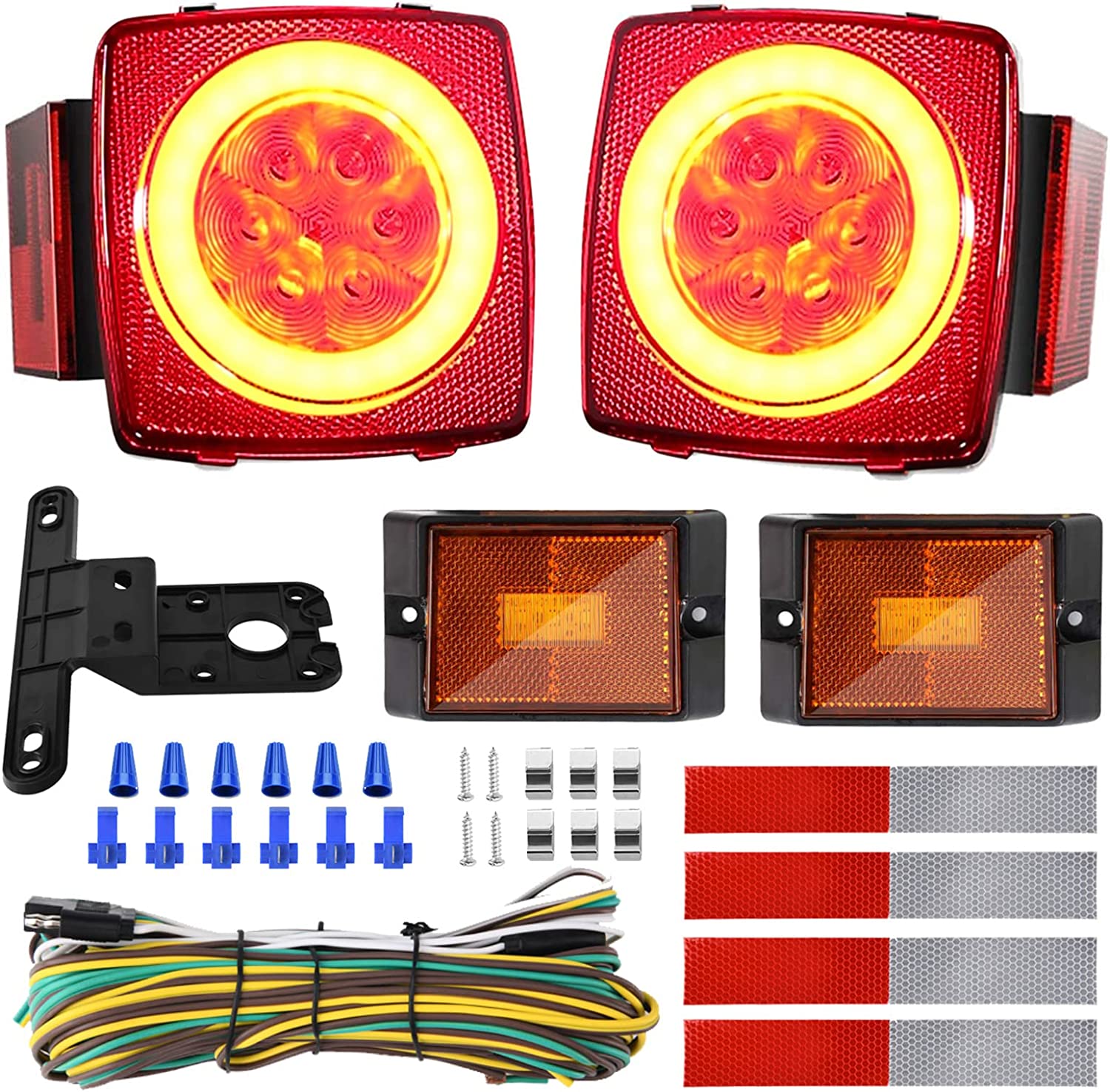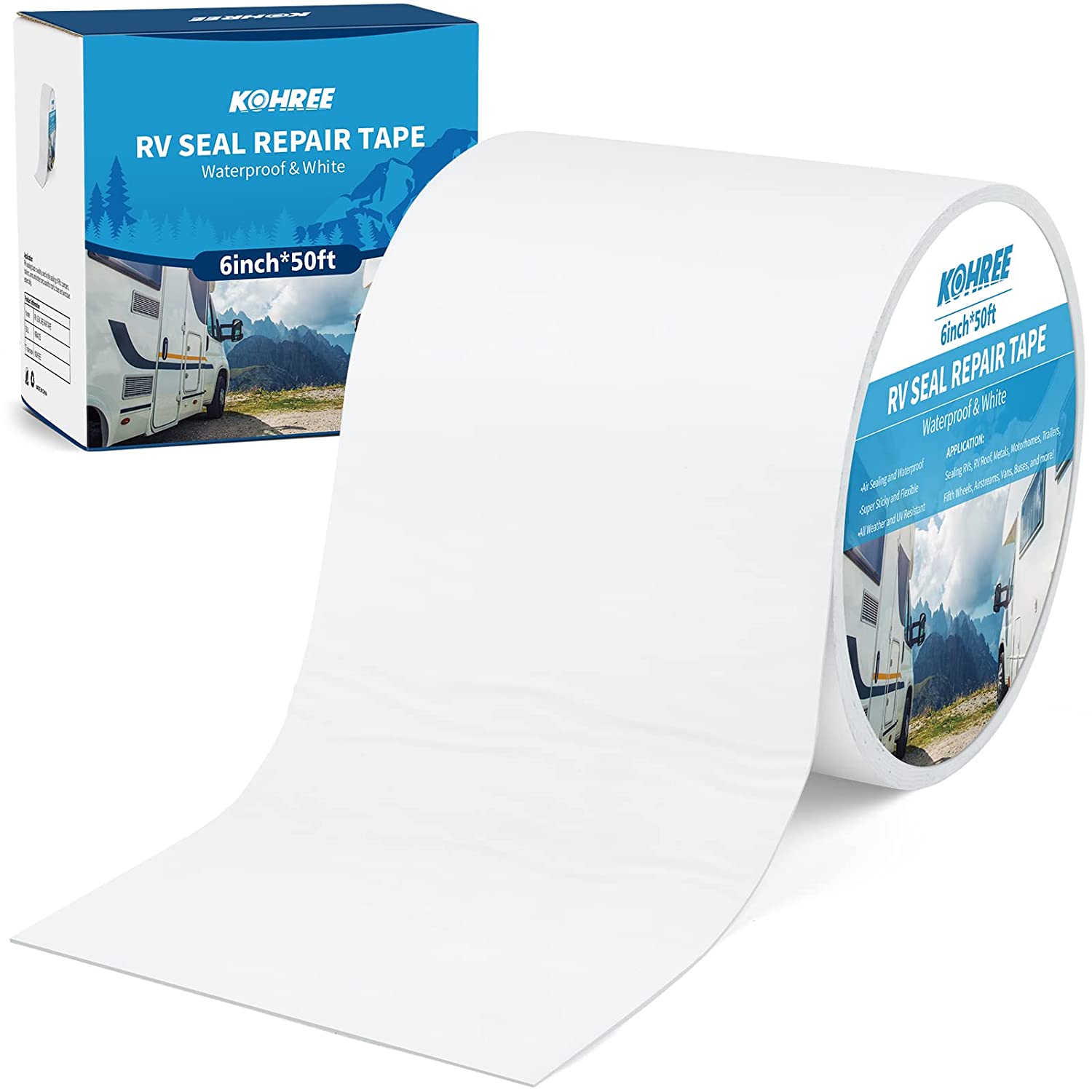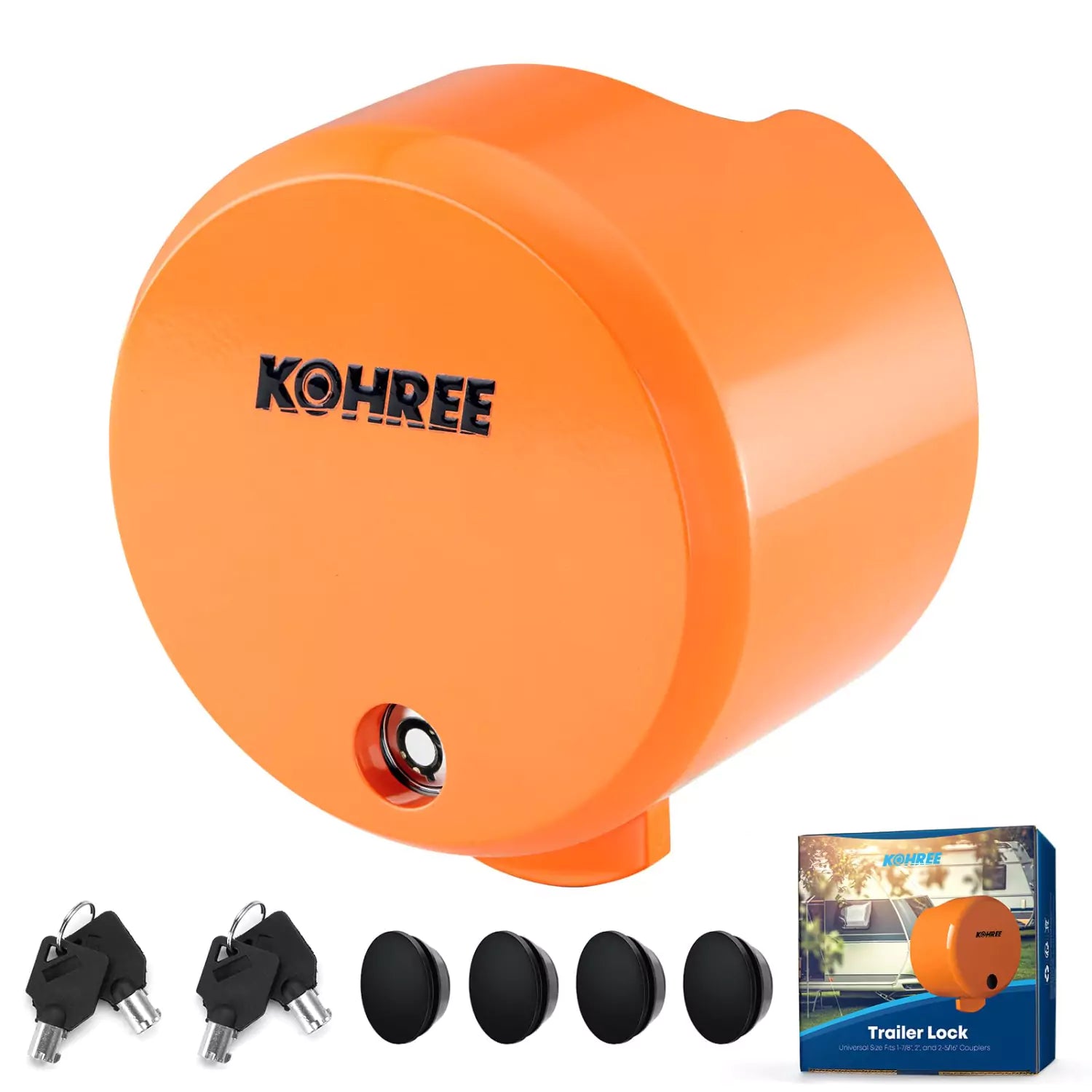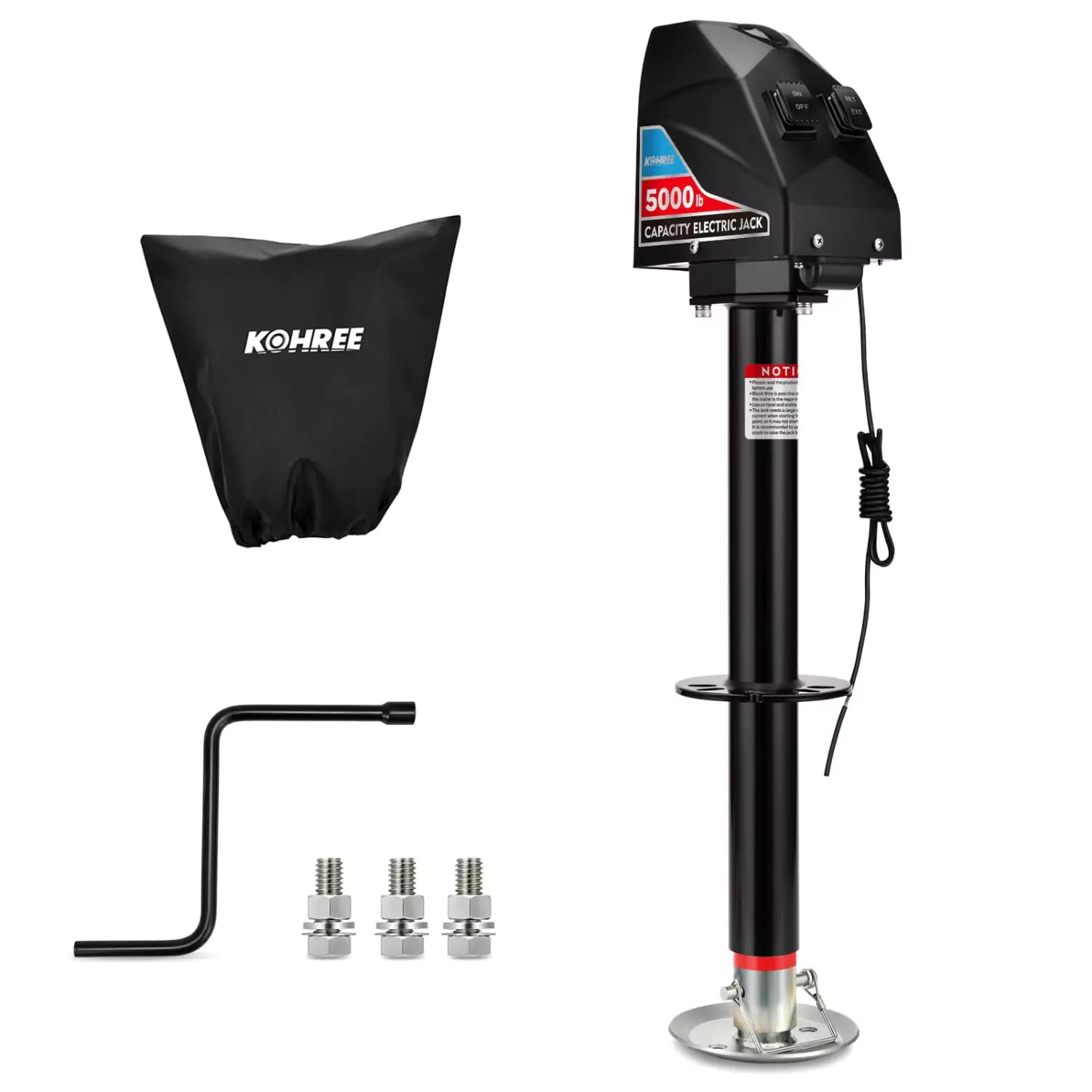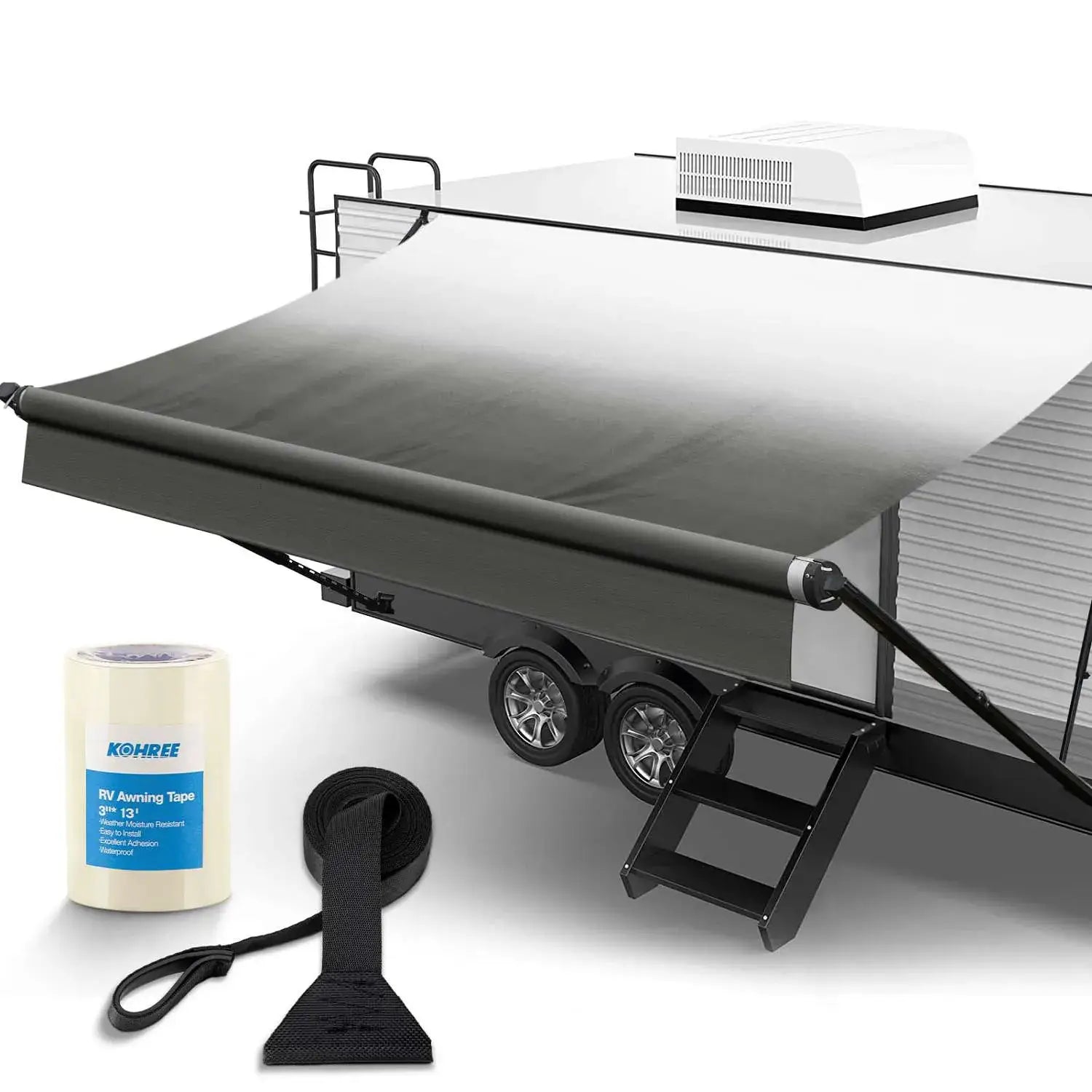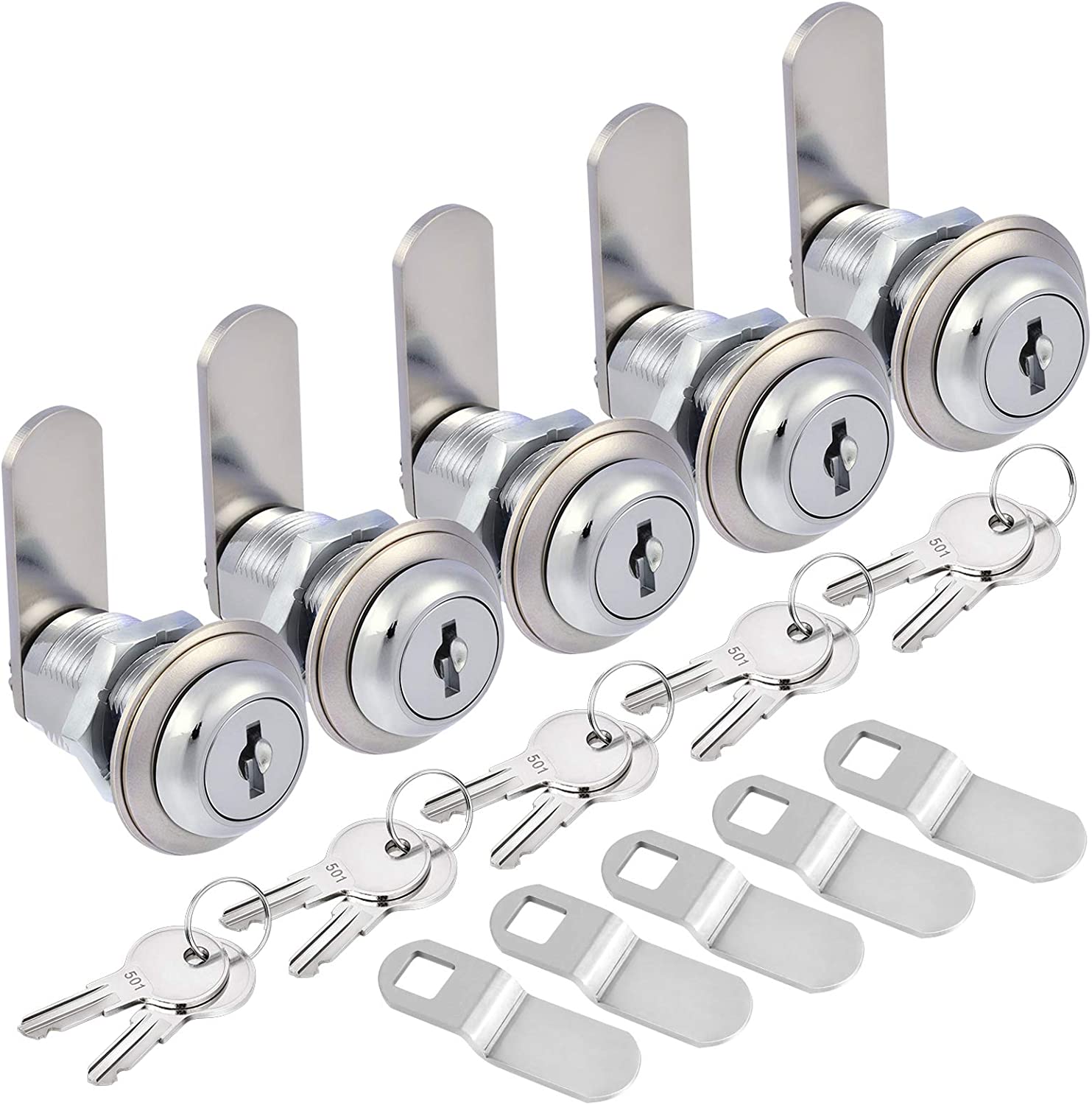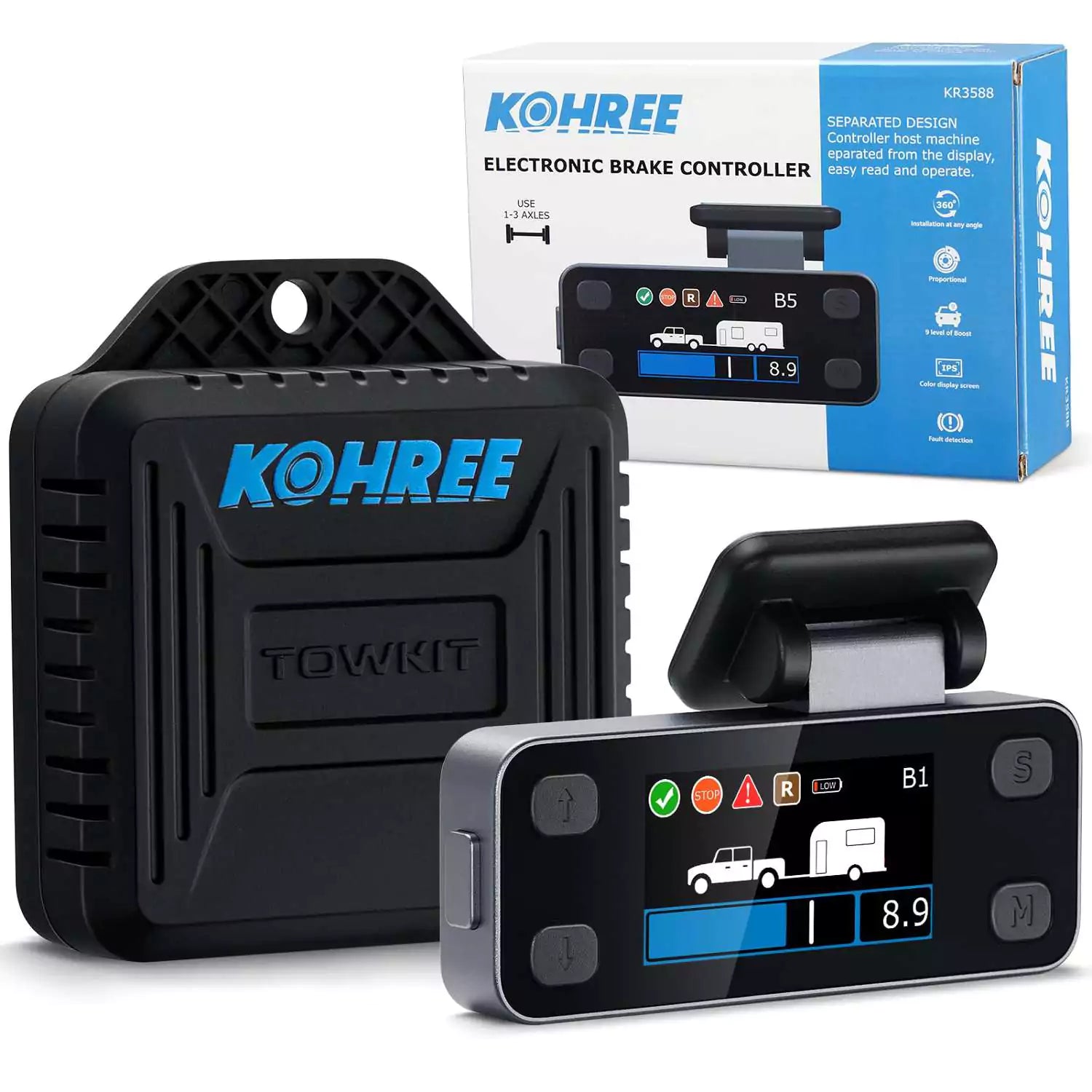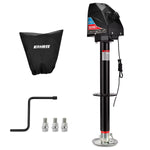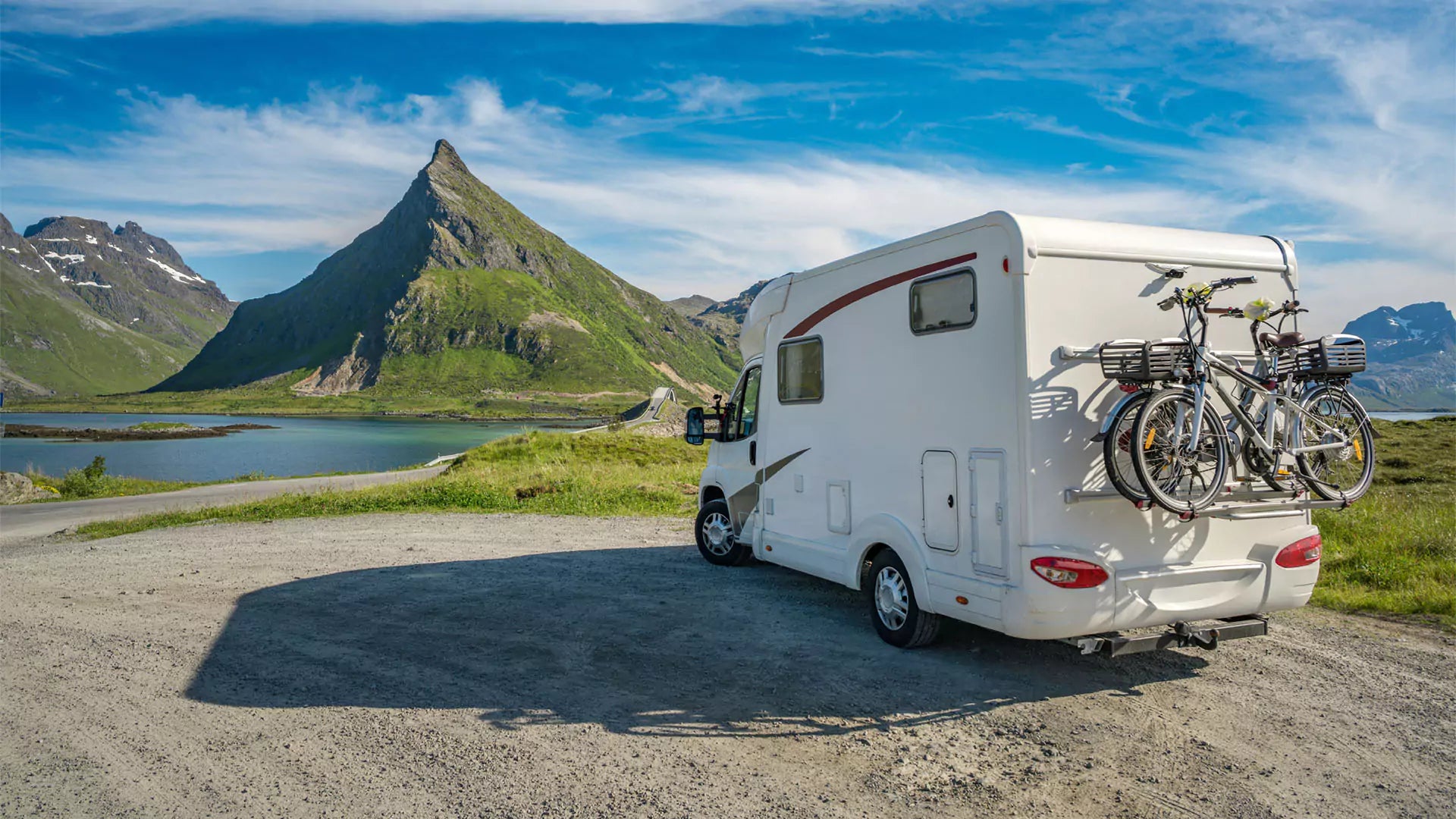If you're a fan of RVing or planning your first RV trip, you might be considering a tankless water heater for your RV. While the debate over whether or not RV tankless water heaters are necessary continues, please imagine this: after a long day of RV adventures, the comforts of home become even more appealing. One of these is undoubtedly hot water on demand.
Whether you're washing dishes after a hearty campfire meal or longing for a warm shower after a day of hiking, having instant access to hot water can make your RV experience much more enjoyable. This is where the RV tankless water heater comes into play, revolutionizing how we think about hot water in recreational vehicles.
This comprehensive guide will dive deep into the RV tankless water heaters. We'll explore their inner workings, compare them to traditional systems, and weigh their pros and cons. By the end of this article, you'll clearly understand whether an RV tankless water heater is the right choice for your motorhome lifestyle and how to choose the best water heater for your camper.
What is the RV tankless water heater?
An RV tankless water heater revolutionizes your camping experience by delivering hot water on demand, eliminating the need for bulky storage tanks. Unlike conventional tank-style models that hold a finite amount of heated water, these innovative heaters instantly warm water as it flows through, ensuring an endless supply of hot water whenever you need it.

How Do the RV Tankless Water Heaters Work?
At its core, an RV tankless water heater operates on a simple yet ingenious principle: heating water on demand. Unlike traditional tank-based systems that store and continuously heat a large volume of water, tankless heaters spring into action only when you turn on the hot water tap.
Here's a step-by-step breakdown of the process:
- When you open a hot water faucet, cold water flows into the tankless heater.
- A flow sensor detects the water movement and signals the heating element to activate. In electric models, heating coils warm up rapidly. In propane models, a burner ignites.
- As water passes through the heat exchanger, it's quickly brought to the desired temperature.
- The heated water then flows out of the faucet, providing instant hot water.

This on-demand system means you're only using energy to heat the water you need, which leads to significant efficiency gains. It's always ready to grant your wish for warmth at a moment's notice!
What is the difference between Tankless and Traditional RV Water Heaters?
The primary distinction between tankless and traditional water heaters lies in their approach to heating and storing water. Traditional water heaters use a large tank to store and constantly heat a fixed volume of water. This system can be inefficient, as it continuously uses energy to maintain the water temperature, even when not in use. Additionally, once the tank is depleted, you must wait for it to refill and reheat before hot water is available again.
In contrast, tankless water heaters heat water on demand, eliminating the need for a storage tank.

This design offers several advantages:
Storage: Traditional heaters store and constantly heat 6-10 gallons of water. Tankless systems heat water as it passes through, requiring no storage.
Energy Efficiency: Tank heaters continuously use energy to maintain water temperature. Tankless units only consume energy when hot water is needed.
Space: Traditional tanks are bulky, taking up precious RV real estate. Tankless models are compact, often wall-mounted, saving valuable space.
Hot Water Supply: With a tank, you're limited to the stored amount. Once depleted, you wait for more to heat. Tankless systems provide endless hot water as long as there's a water and power supply.
Lifespan: Traditional tanks typically last 10-15 years. Tankless systems can last over 20 years or more with proper maintenance.
Initial Cost: Tankless systems generally have a higher upfront cost but can save money long-term through energy efficiency.
What are the types of RV Tankless Water Heaters?
Propane RV Tankless Water Heater
Propane tankless water heaters are popular among RV enthusiasts due to their efficiency and power. They use propane gas to generate heat, making them ideal for off-grid camping where electricity is limited. These heaters are known for their quick heating capabilities and ability to maintain a consistent water temperature. Key features include:
- High heating capacity: Propane heaters can typically produce more hot water per minute than electric models.
- Independence from electrical hookups: Ideal for boondocking or camping in remote areas.
- Cost-effective operation: Propane is often cheaper than electricity in many regions.
However, they do require proper ventilation and regular maintenance of the propane system.

Electric RV Tankless Water Heater
Electric models are perfect for RVs with reliable access to electricity. They offer precise temperature control and are typically easier to install than their propane counterparts. However, they may not heat water as quickly as propane models, making them better suited for smaller households or less frequent use. Benefits include:
- Simple installation: No need for gas lines or venting.
- Quiet operation: Electric heaters are generally quieter than propane models.
- Low maintenance: With fewer moving parts, they require less upkeep.
The main drawback is their reliance on a stable electrical supply, which may not always be available in remote camping locations.

When choosing an electric RV water heater, it's crucial to verify your RV's voltage and power requirements. Ensure that it can support the necessary wattage for the water heater. Additionally, it's important to note that tankless electric water heaters may require a higher voltage connection. Therefore, an appropriate electrical setup is essential.
Advantages of RV Tankless Water Heaters
Now that we've got a solid understanding of how RV tankless water heaters work and the different types available, let's dive into the juicy part - the benefits. I believe you'll exclaim after reading this: "Why didn't I know about such an efficient RV companion sooner!"
Energy Efficiency
One of the most significant benefits of RV tankless water heaters is their superior energy efficiency. When you're off-grid for extended periods, conserving energy becomes especially valuable. More electricity means you can use more appliances for longer periods while on the road, adding more fun to your RV lifestyle.
Unlike traditional tank heaters that constantly use energy to maintain water temperature, tankless systems only operate when hot water is needed. This on-demand heating approach can result in substantial energy savings, reducing both your carbon footprint and operating costs. Even when connected to shore power, an RV tankless water heater allows you to enjoy the convenience of hot water just like at home.
Space-Saving Design
In a camper, every inch of space is precious. Most tankless water heaters are about the size of a large suitcase and can be mounted in cabinets, under sinks, or on exterior walls. This space-saving design offers more flexible RV layouts and increased storage, improving comfort and convenience. Imagine the bulky traditional tanks that can take up an entire closet!
Unlimited Hot Water Supply
Assume that you've just finished a long day of hiking. You're covered in dust, sweat, and maybe a little bit of regret for that "shortcut" you took. All you want is a long, hot shower. With a traditional tank heater, you might be racing against the clock (and your fellow travelers) to finish before the hot water runs out. But with an RV tankless water heater? It's shower time, all the time!
Say goodbye to drawing straws for who gets the first shower. With tankless, the last person gets just as much hot water as the first.
As long as there's a water source and fuel (propane or electricity), you'll never run out of hot water mid-shower or during other high-demand situations. This continuous flow ensures comfort and convenience, especially for larger families or when hosting guests in your RV.
Durable and Long-Lasting
When it comes to RV appliances, longevity is key. After all, who wants to spend their vacation time troubleshooting a faulty water heater? Here's where RV tankless water heaters prove their worth:
RV tankless water heaters are built to last. While traditional tank heaters typically last 10-15 years, the tankless system typically have a longer lifespan than traditional tank heaters. Many models can last up to 20 years or more with proper maintenance, making them a sound long-term investment for your RV.
Because they only operate when needed, tankless heaters experience less stress over time. With fewer parts and no tank to corrode, tankless systems are generally easier to maintain. Plus, many models have self-diagnostic features that can alert you to potential issues before they become problems.
If something does go wrong, many tankless heaters have easily replaceable parts. It's like having a modular system - you can often fix issues without replacing the entire unit.
Investing in an RV tankless water heater isn't just about immediate benefits - it's a long-term strategy for reliable, efficient hot water in your home away from home.
Disadvantages of RV Tankless Water Heaters
While RV tankless water heaters offer many advantages over traditional RV water heaters, they also have some drawbacks that you should be aware of. One significant issue is hard to control appropriate temperature, which is why many RV owners still rely on traditional tank water heaters for their primary outdoor water supply. Understanding both the pros and cons will help you make the best decision for your RV lifestyle.
Initial Cost
While RV tankless water heaters offer advanced technology, they typically come with a higher upfront cost compared to traditional tank water heaters. This is an investment in efficiency and convenience.
Beyond the initial purchase, tankless water heaters often require professional installation due to their complex setup, adding to the overall cost. Depending on your RV's current setup, you may need to upgrade your electrical system or propane lines to accommodate the new heater. It's essential to consider the entire system, not just the heater itself.
Before making a purchase, weigh the initial investment against potential long-term savings. Just like energy-efficient light bulbs may be slightly more expensive than incandescent lamps, the long-term savings in electricity bills and service life will be huge benefits. Think of it as an investment in your future hot showers!
Potential for Delayed Heating
While RV tankless water heaters are known for providing hot water on demand, this doesn't mean you'll get the perfect temperature as soon as you turn on the tap. There might be a brief delay before reaching your desired temperature. Why is this happening:
Activation Time: There's a brief period between when you turn on the hot water and when the heater kicks in. It's usually just a matter of seconds, but if you're used to instant hot water from a tank system, you might notice the difference.
Distance Factor: If your tankless heater is far from the faucet, it can take a moment for the hot water to travel through the pipes. It's like waiting for your favorite song to buffer on a slow internet connection - a little frustrating, but worth the wait.
Cold Weather Challenges: In very cold climates, the incoming water temperature can be so low that it takes the heater a bit longer to reach the desired temperature. It's like trying to warm up after jumping in a freezing lake - it takes a minute!
These delays are usually negligible, much like the slight wait you experience with your home's instant water heater. I think the benefits outweigh the minor inconvenience. However, if immediate hot water is crucial to you, it's worth considering.
The "Cold Water Sandwich" Effect: This word sounds like a bad joke, but it's a funny phenomenon that occurs in both electric water heaters and tankless water heaters:
What is it? The "cold water sandwich" occurs when you use the water heater to turn the hot water on, off, and then on again in quick succession. You might get a burst of hot water, followed by a slug of cold water, before the hot water returns. It's like a temperature rollercoaster in your pipes!
Why It Happens: This happens because the heater shuts off when you turn off the tap, and there's a brief delay before it fires up again when you turn it back on. Meanwhile, the cold water in the pipes gets pushed out first.
Frequency: It's worth noting that this effect is more common in older or lower-quality tankless heaters. Many modern RV tankless water heaters have features designed to minimize or eliminate this issue.
While not a deal-breaker for most, it's something to be aware of, especially if you're prone to quickly turning taps on and off.
Warm reminder: Test the water temperature with your hands before taking a shower.
Temperature Regulation Challenges
A long-standing issue with tankless water heaters has been the difficulty in achieving the desired water temperature. This is primarily due to:
Flow Rate Sensitivity: The water temperature can fluctuate if the flow rate changes dramatically. For example, if someone flushes a toilet while you're showering, you might feel a sudden temperature change.
Minimum Flow Rate: Most tankless heaters require a minimum flow rate to activate. If you're trying to get just a trickle of hot water (like for shaving), you might not meet this threshold.
Temperature Increments: Some models only allow you to adjust the temperature in preset increments. In other words, it's hard to find the perfect temperature setting.
The good news is that a growing number of RV tankless water heaters like Kohree RV tankless water heater are being equipped with smart temperature control sensors. These sensors enable you to accurately set your desired water temperature. It's worth checking if a particular model has this feature before purchasing.
Requires professional installation
Unlike traditional RV water heaters, which can often be DIY-installed, tankless systems typically require professional installation. Their complex nature and the need for proper venting or electrical wiring necessitate expert assistance. Be sure to factor in the cost of professional installation when considering a tankless water heater for your RV.
How to Choose the Right RV Tankless Water Heater?
Whether you're purchasing an electric or propane tankless water heater, understanding the key parameters of tankless water heaters is essential. In this section, I will discuss the critical factors that affect your water usage experience and help you choose the most suitable RV tankless water heater for your needs.
Fuel Source Options (Propane or Electric)
The first big decision you'll need to make is whether you want a propane or electric RV tankless water heater. Each has its own set of pros and cons:
Propane:
Pros: Higher flow rates, great for boondocking, widely available fuel.
Cons: Requires ventilation, needs to refill propane tanks.
Electric:
Pros: Energy saving, adjustable water temperature, fast heating.
Cons: Requires stable electrical supply, may not be suitable for all camping situations.
Consider your typical camping style and RV setup. Do you often find yourself off the grid? Propane might be your best bet. Always hooked up to shore power? An electric model could be perfect.
Space Size (Small, Medium, or Large)
The physical dimensions of the tankless water heater are crucial, especially in the limited space of an RV. Measure the available installation area carefully and choose a unit that fits comfortably without impeding other systems or storage areas. While tankless heaters are generally compact, sizes can vary between models and brands.
Water flow rate
Before purchasing an RV tankless water heater, estimate your water consumption to determine the appropriate size.
Consider these average water usage rates: basic needs, one task at a time (1-2 gallons per minute), dishwashing (1.5 gallons per minute), showers (1.5-3 gallons per minute), bathtubs/toilets (2-4.5 gallons per minute), and, high demand, multiple showers/appliances (4+ gallons per minute). This information will help you choose a heater that meets your needs.
Heating Capacity (BTU)
The heating capacity is measured in British Thermal Units (BTU). A higher BTU rating means the unit can heat water more quickly and handle higher flow rates.
30,000-50,000 BTU: Suitable for small to medium RVs.
50,000-75,000 BTU: Good for medium to large RVs.
75,000+ BTU: Ideal for large RVs or cold climate use Remember, a higher BTU rating means the unit will use more power, so balance your hot water needs with power efficiency.
Power Consumption and Efficiency
For electric models consider the power consumption in kilowatts (kW). Higher kW ratings provide more heating power but also draw more electricity. Look for models with high energy efficiency ratings to minimize power consumption while still meeting your hot water needs.
Temperature Control
When purchasing a tankless water heater for your RV, it's important to consider the temperature control system. Traditional propane tankless water heaters often rely on manual knobs to adjust water temperature. This can be inconvenient when you need hot water quickly. On the other hand, electric tankless water heaters for RVs typically come with remote controls and digital displays for precise temperature adjustments. Some models even offer a timer function for added to bring a more comfortable experience after your tiring day.
Safety Features
You should also pay attention to additional safety measures when selecting a tankless water heater for your RV to ensure maximum safe use. For example:
Overheating protection: Automatically shut down when the temperature is too high during use.
Automatic shutdown protection: Prevent the system from insufficient voltage or peak overload.
Antifreeze protection: Avoid freezing components in extremely cold weather.
Low water pressure shut-off: Protects the unit from damage caused by insufficient water flow.
Essential Tips for Running RV Tankless Water Heaters Better
You're almost there! To become a pro at choosing RV tankless water heaters, here are three advanced tips to help you maximize your RV investment and enjoy the ultimate hot water experience.
Preventing empty water tanks
If you know you're heading to a spot with limited water access, fill up before you go. It's the RV equivalent of filling up your gas tank before a long road trip.
Remember, your RV tankless water heater needs water to function properly. No water means no hot showers, and nobody wants that!
Running the heater without water can cause severe damage to the unit. Install a low-water cutoff switch if your model doesn't already include one, and regularly check water levels, especially during extended trips.
Turning off propane tanks before travel
If you've got a propane rv tankless water heater, this tip is crucial. Always, always, ALWAYS turn off your propane tank before hitting the road. Here's why:
Prevent Leaks: Even tiny bumps in the road can loosen connections over time. Turning off the propane prevents any potential leaks during travel.
Save Fuel: Why waste propane when you're not using it? It's like leaving your car running while you're grocery shopping - unnecessary and wasteful.
Addressing common misconceptions
Several misconceptions about tankless water heaters can lead to improper use or maintenance:
Myth 1: Tankless heaters provide instant hot water.
Reality: There's a slight delay as the water heats up and travels through the pipes. It's quick, but not instantaneous.
Myth 2: Tankless heaters are maintenance-free.
Reality: While they require less maintenance than tank heaters, they still need regular check-ups. Think of it like your annual doctor's visit - prevention is better than cure!
Myth 3: Tankless heaters are too complicated for RV use.
Reality: Modern RV tankless water heaters are designed with RVers in mind. They're user-friendly and often come with helpful features like digital displays and remote controls.
Myth 4: You can't use tankless heaters in cold climates.
Reality: Many models come with freeze protection features. Just be sure to choose one rated for your typical camping temperatures.
Myth 5: Tankless heaters are always more expensive to run.
Reality: While the initial cost is higher, the long-term energy savings often make them more economical over time.
By understanding these misconceptions, you can make more informed decisions about your RV tankless water heater and get the most out of your investment.
Common FAQs About RV Tankless Water Heaters
Why My RV Tankless Water Heater Can't Started After Installation?
If your newly installed tankless water heater fails to start, consider these potential causes:
1. Improper power connection: Ensure all electrical connections are secure and correct.
2. Gas supply issues: For propane models, check that the gas valve is open and the propane tank is not empty.
3. Water flow problems: Verify that water is flowing through the unit when a hot water tap is opened.
4. Activation sensor malfunction: Some units may have faulty flow sensors that prevent activation. If troubleshooting doesn't resolve the issue, consult a professional or the manufacturer's support team.
Can I Take a Long Shower with a Tankless Water Heater?
Yes, one of the primary advantages of tankless water heaters is their ability to provide continuous hot water. As long as the water flow rate doesn't exceed the unit's capacity and there's a sufficient water and power supply, you can enjoy long, uninterrupted showers. However, be mindful of your fresh water tank levels in off-grid situations.
Will an RV Tankless water heater work if the power goes out?
This depends on the type of RV tankless water heater you have:
Propane Models: Good news! Most propane tankless water heaters will continue to work during a power outage. They typically use battery-powered ignition systems, so as long as you have propane and water pressure, you're good to go.
Electric Models: Unfortunately, electric tankless water heaters won't work without power. They require electricity to heat the water, so no power means no hot water.
Pro Tip: If you frequently camp in areas with unreliable power, consider a propane or hybrid model for uninterrupted hot water access.
Does the Tankless Water Heater Needs to Clean?
Yes, like any appliance, your RV tankless water heater benefits from regular cleaning and maintenance. Here's why and how:
Why Clean?
Mineral Build-up: Over time, minerals in the water can accumulate in your heater, reducing efficiency and potentially causing damage.
Improved Performance: Regular cleaning ensures your heater operates at peak efficiency.
Extended Lifespan: Proper maintenance can significantly extend the life of your heater.
How to Clean?
Flush the System: Run a vinegar solution through the heater to dissolve mineral deposits. Many RVers do this annually.
Clean the Inlet Filter: This prevents debris from entering the heater.
Check Venting: For propane models, ensure vents are clear of obstructions.
Inspect Connections: Look for any signs of leaks or corrosion.
Always consult your owner's manual for specific cleaning instructions for your model.
Why does my tankless water heater go cold in the middle of a shower?
Intermittent cold water during use can be caused by several factors:
- Flow rate fluctuations: Sudden changes in water pressure can confuse the heater's sensors.
- Mineral buildup: Scale accumulation can affect heating efficiency and cause temperature fluctuations.
- Overloaded system: Using multiple hot water outlets simultaneously may exceed the unit's capacity.
- "Cold water sandwich" effect: This temporary phenomenon can occur when restarting the heater after a brief pause in water flow.
Regular maintenance and choosing a properly sized unit for your needs can help minimize these issues.
Kohree Best RV Tankless Water Heater
Kohree offers top-quality tankless water heaters specifically designed for RVs. We provide two types of propane tankless water heaters to cater to different RV setups and user preferences. You can choose a model that's designed solely for bathroom use or one that can supply hot water to your entire RV's water system. Let's explore two of our most popular models.
If you're looking for an efficient and convenient way to provide hot water throughout your RV's water system, our RV tankless water heater might be the perfect solution. Here's why it stands out:
Instant Hot Water: Experience immediate warmth with the Kohree RV tankless water heater, It is propane-powered, and it ensures a reliable energy source for cozy RV travels. Surpassing conventional tanks by supplying continuous hot water for showers, dishwashing, and more on demand. Eliminate the hassle of mid-shower cold spells.

Powerful Performance: Our RV tankless water heater boasts an impressive 60,000 BTU/hour output, capable of producing up to 2.9 gallons of hot water per minute. Equipped with a high-altitude mode, its low-pressure startup can operate at just 1.45 PSI, ensuring a steady hot water flow even at high altitudes like Denver's 5,000+ foot plateau.

Safety First: Our RV tankless water heater integrates a comprehensive suite of safety features, including boil-dry prevention, self-diagnostic checks, flame-out protection, overheating defense, electric leak insulation, overpressure relief, frost resistance, and gas leakage detection. Every use is safeguarded and efficient.
Precise Temperature Control: Customize your warmth experience with adjustable temperatures ranging from 95°F to 123°F (35°C-51°C). Advanced staged combustion technology adjusts flame intensity seasonally, preventing overheating and conserving propane during extended journeys. This ensures a stable temperature, guarding against sudden spikes and potential burns.

User-Friendly Controls: Designed with the user in mind, this RV tankless heater features a clear control panel with an easy-to-read display and intuitive interface. Adjust temperatures effortlessly and monitor real-time data, including temperature, combustion status, flow rate, fan operation, error codes, and warnings, via the remote control.

Compatible for Most Motorhome: Engineered to fit snugly into limited RV spaces without sacrificing hot water capacity, Kohree maximizes efficiency. Universally compatible to replace most RV water heaters, it comes with a 15" x 15" door and a 13" x 13" opening for easy installation. The package includes a 2-meter-long smart remote and an in-built pressure relief valve, simplifying setup and enhancing safety.

For those who frequently embark on outdoor adventures, the Kohree Propane RV Tankless Water Heater offers unparalleled freedom and flexibility. Here's why it's a top choice:
Efficient Energy Utilization: Our RV tankless propane water heater is built with high-quality brass connectors. It boasts an advanced combustion design, delivering a powerful 41,000 BTU/hour output. It provides a steady flow of 1.58 gallons per minute (GPM) and activates at a low water pressure of just 3 PSI. Enjoy a comfortable temperature range from 50°F (10°C) to 140°F (60°C), all without the bulk of a storage tank. You can adjust and control the water temperature to your liking for a comfortable experience and reduced gas expenses.

CSA Certified Safety: Rest assured with our propane water heater, certified to meet both Canadian and American safety standards. It offers six-in-one protection: freeze, overheat, low water flow, dry burn, high water pressure, and flameout defenses. Plus, the windproof design ensures uninterrupted use even in breezy outdoor conditions.

Portable Outdoor Companion: Lightweight at just 12 pounds, this propane instant water heater is easy to transport and set up. Perfect for outdoor showers, it installs in minutes. Hang it easily using the provided handle or mounting bracket. For safety, always connect the gas pipe to the inlet before use to prevent gas leaks.

Versatile Usage: Suitable for a variety of settings, from off-grid locations to remote areas, this propane water heater is ideal for your home, cabin, RV, poolside, pet bathing, and vehicle cleaning. Never run out of hot water, no matter where your adventures take you.

Both these Kohree models exemplify the brand's commitment to quality, efficiency, and user-friendly design. Kohree offers an RV tankless water heater that can elevate your RV experience.
Conclusion
Embracing the convenience of a tankless water heater can significantly enhance your RV experience. Choosing between these models depends on your specific needs, camping style, and RV setup. Consider factors like your typical camping locations, power availability, climate conditions, and hot water usage patterns. Ultimately, an RV tankless water heater is more than just an appliance - it's an investment in comfort, efficiency, and the quality of your lifestyle.
